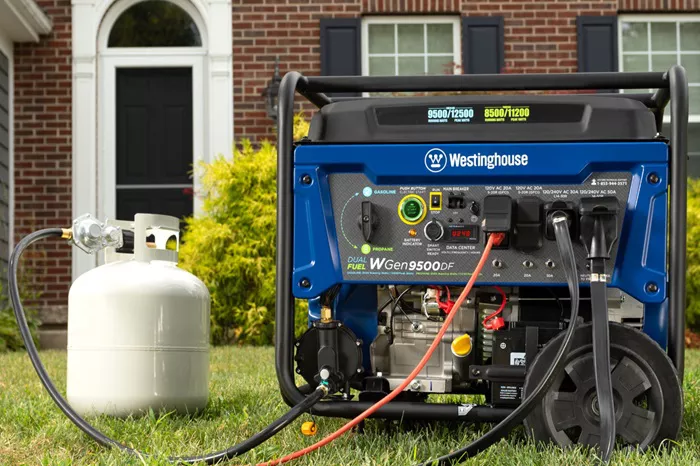your lights on, appliances running, and family safe. Choosing the right generator depends on power needs, fuel type, and budget. In this guide, we’ll explore the top 10 generators for home use, along with key electrical concepts to help you make an informed decision.
What to Consider When Buying a Home Generator
Before diving into the best models, let’s break down the essential factors:
Power Output (Wattage)
Generators are rated in watts (W) or kilowatts (kW).
Starting Watts : Extra power needed when appliances first turn on (e.g., refrigerators, AC units).
Running Watts : Continuous power required to keep devices running.
Fuel Type
Gasoline : Affordable but less efficient for long-term use.
Propane : Cleaner burning, stores longer than gasoline.
Diesel : High efficiency, best for heavy-duty use.
Dual Fuel : Runs on both gasoline and propane for flexibility.
Generator Types
Portable Generators : Mobile, best for short outages.
Inverter Generators : Quieter, fuel-efficient, ideal for sensitive electronics.
Standby Generators : Permanently installed, automatically turn on during outages.
Noise Level
Measured in decibels (dB). Inverter generators are quieter (50-60 dB) compared to conventional models (70+ dB).
Transfer Switch Requirement
For safety, a transfer switch disconnects your home from the grid to prevent backfeeding, which can harm utility workers.
Top 10 Home Generators in 2024
Now, let’s review the best generators available today.
Champion 100263 – Best Overall Portable Generator
Power: 12,500 starting watts / 9,500 running watts
Fuel: Gasoline
Runtime: 10 hours at 50% load
Features: Electric start, CO detection, durable steel frame
Best For: Whole-house backup during storms
Westinghouse WGen9500 – Heavy-Duty Powerhouse
Power: 12,500 starting watts / 9,500 running watts
Fuel: Gasoline
Runtime: 12 hours at 50% load
Features: Remote start, transfer switch ready
Best For: Large homes with high power demands
Honda EU2200i – Best Inverter Generator
Power: 2,200 starting watts / 1,800 running watts
Fuel: Gasoline
Runtime: 8 hours on 1 gallon
Features: Super quiet (48 dB), parallel capable
Best For: Camping, RVs, and small home backup
Generac GP8000E – Reliable & Budget-Friendly
Power: 10,000 starting watts / 8,000 running watts
Fuel: Gasoline
Runtime: 11 hours at 50% load
Features: Electric start, durable construction
Best For: Emergency home backup
DuroMax XP12000EH – Dual Fuel Flexibility
Power: 12,000 starting watts / 9,500 running watts
Fuel: Gasoline or propane
Runtime: 8 hours (gas), 5 hours (propane)
Features: Switch fuel types on the fly
Best For: Extended outages with fuel options
Briggs & Stratton 30651 – Standby Generator
Power: 20,000 watts (whole-house coverage)
Fuel: Natural gas or propane
Features: Auto-transfer switch, 24/7 monitoring
Best For: Permanent home backup
Jackery Explorer 2000 Plus – Solar-Ready Power Station
Power: 3,000W (expandable with extra batteries)
Fuel: Lithium battery (solar-compatible)
Runtime: Varies based on usage
Features: Silent, portable, eco-friendly
Best For: Off-grid homes, solar users
Firman WH03242 – Tri-Fuel Generator
Power: 4,500 starting watts / 3,650 running watts
Fuel: Gasoline, propane, or natural gas
Runtime: 10 hours (gasoline)
Features: CO shutoff, electric start
Best For: Versatile fuel options
EcoFlow Delta Pro – High-Tech Battery Generator
Power: 3,600W (expandable to 25kWh)
Fuel: Lithium battery (solar/grid rechargeable)
Runtime: Powers a fridge for 10+ hours
Features: Smart app control, fast charging
Best For: Smart homes, tech-savvy users
Predator 9500 – Affordable & Powerful
Power: 9,500 starting watts / 7,500 running watts
Fuel: Gasoline
Runtime: 12 hours at 50% load
Features: Electric start, durable steel frame
Best For: Budget-conscious buyers needing high power
How to Safely Use a Home Generator
Never run indoors : Generators emit carbon monoxide (CO). Keep them at least 20 feet from the house.
Use heavy-duty extension cords : Rated for outdoor use to prevent overheating.
Install a transfer switch : Required for standby generators to prevent backfeeding.
Regular maintenance : Change oil, check fuel filters, and test periodically.
Conclusion
The best generator for your home depends on power needs, fuel preference, and budget. For whole-house backup, consider standby generators like Briggs & Stratton. For portability, the Champion 100263 or Honda EU2200i are excellent choices. By understanding wattage, fuel types, and safety, you can confidently choose the right generator to keep your home powered during outages. Would you like recommendations based on your specific needs? Let us know in the comments!

